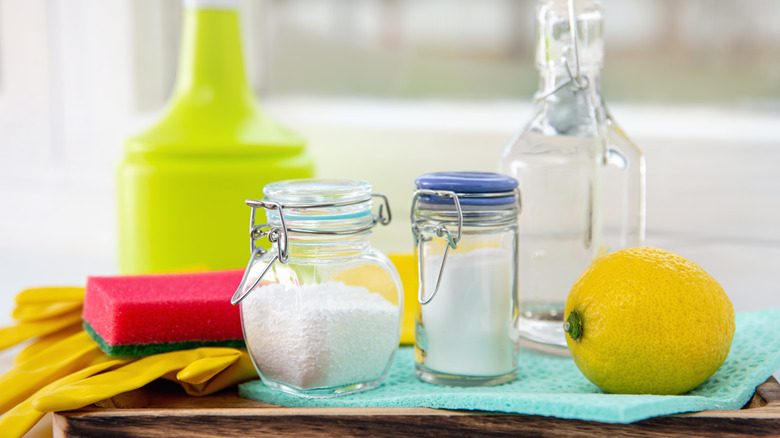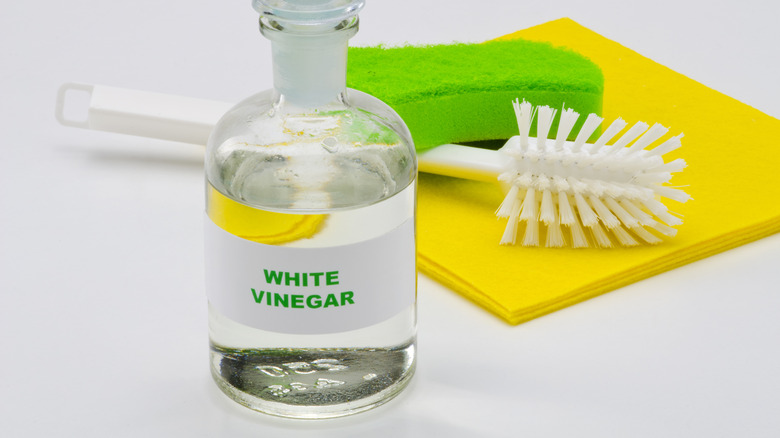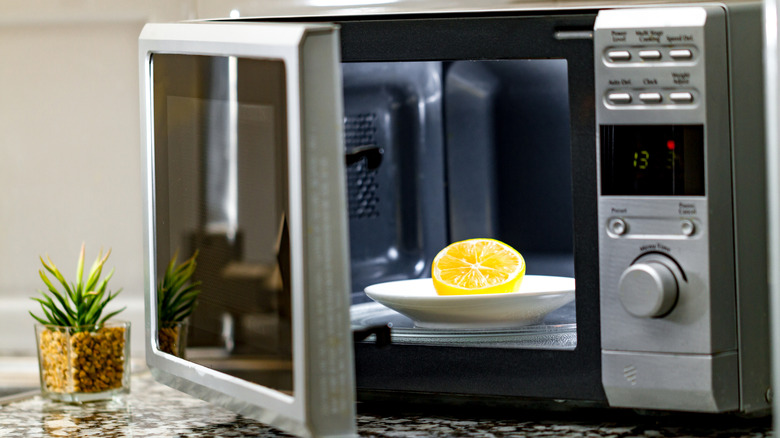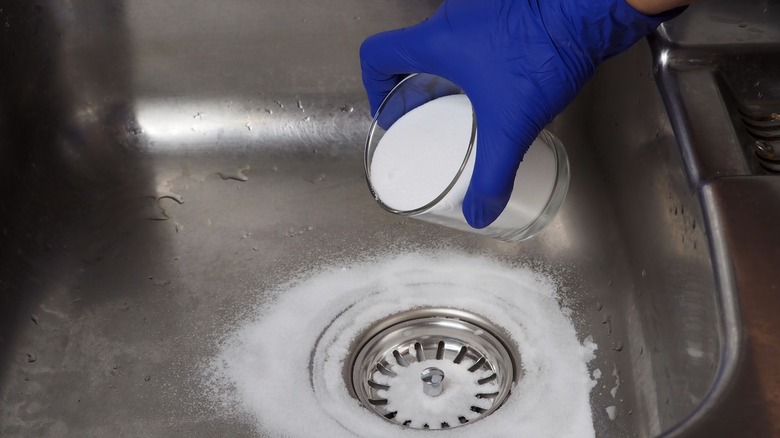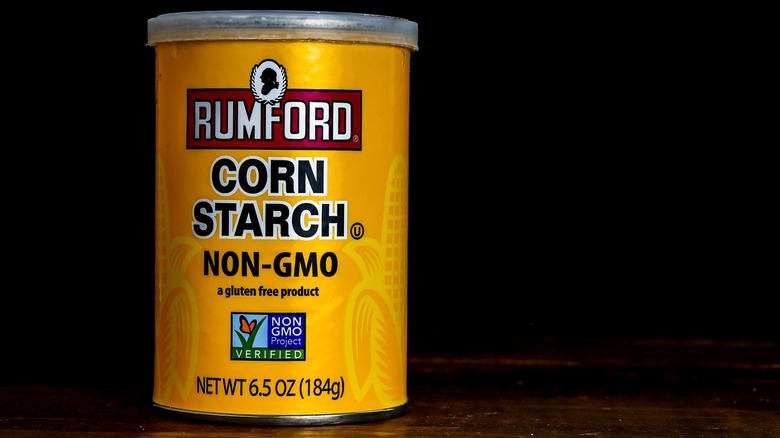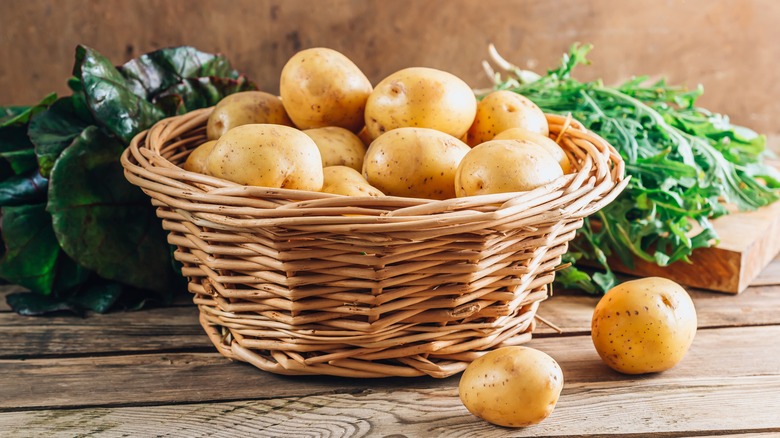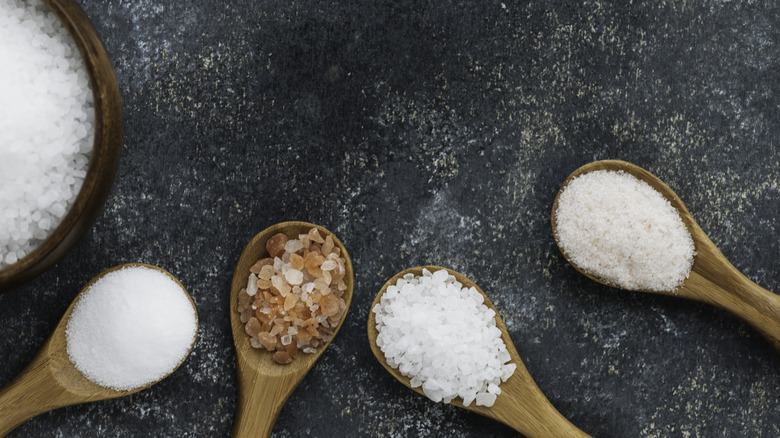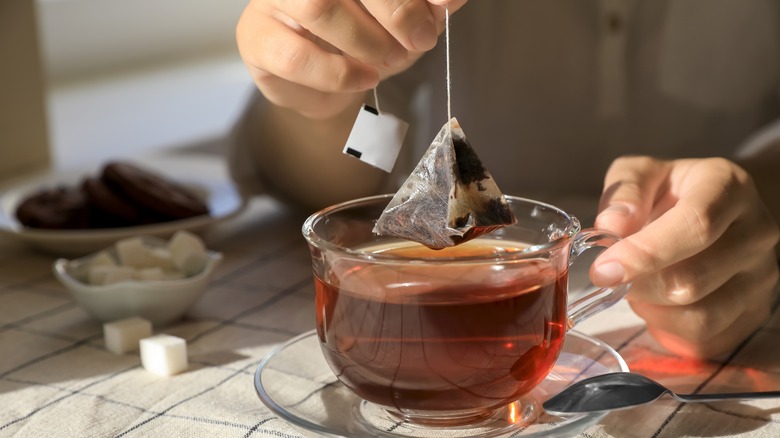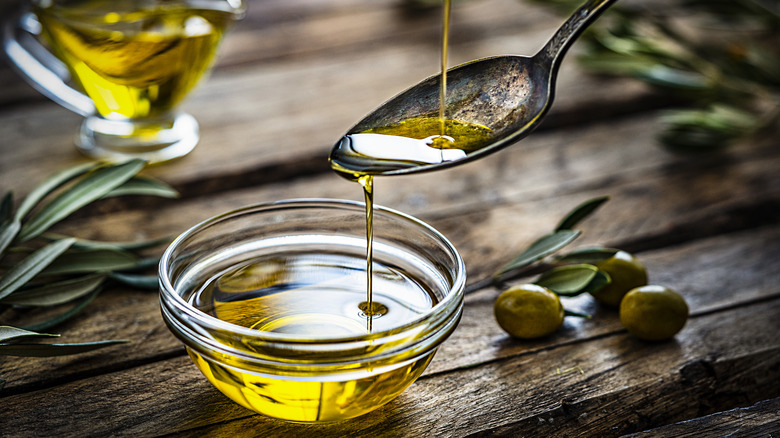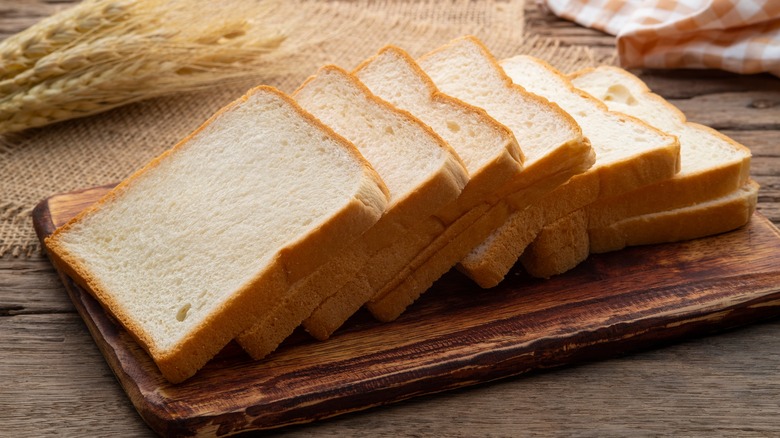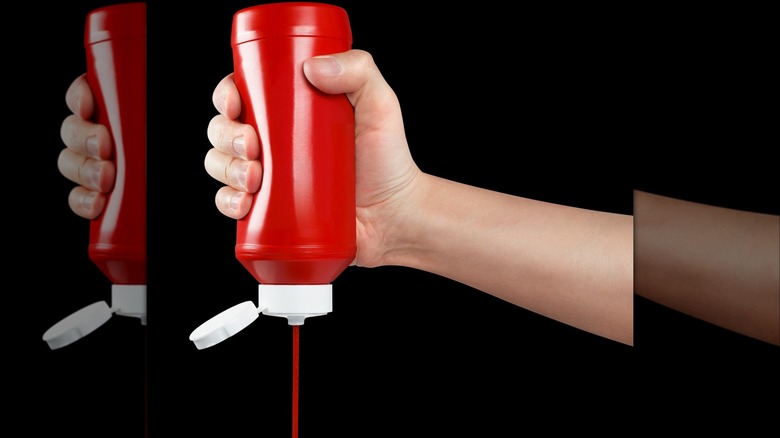10 Pantry Staples That Are Great For Cleaning Your Kitchen
Keeping your kitchen clean is a chore. Literally. If you're like many, you may be looking for more natural cleaning products that won't expose you and others to potentially hazardous cleaning chemicals. Well, good news! The products you need to clean your kitchen are stored in your pantry or refrigerator.
That's right, several common food items double as effective kitchen cleaners. Did you know you can use some of your favorite burger condiments to keep your kitchen clean? Or, that basic table salt helps with getting rid of bacteria and odors? Well, these are just a few of the tips in the next few sections. I've tried cleaning with a number of these pantry staples before and have seen just how well they work. For the ones I haven't had the chance to try yet, I scoured the internet for more information about how and why they work so well.
White vinegar
Chances are pretty good that you have some white vinegar in your pantry to use for preparing homemade salad dressing, pickling vegetables, or making buttermilk. As handy as buttermilk is for your cooking tasks, you'll find it equally useful when cleaning your sink. It turns out that the acetic acid in vinegar makes it a very versatile cleaner. Just dilute the vinegar with water at a 1:1 ratio, and take advantage of its natural disinfectant properties to rid your kitchen of germs and bacteria.
Bacteria accumulate in the kitchen sink. Just spritz your sink down with the diluted vinegar and wipe it using a soft cloth. Vinegar is food-safe, so you don't have to worry about bleach or other chemicals getting mixed with your food the next time you prepare something.
If you're dealing with grease splatters all over your stove or your backsplash, harness the power of vinegar to clean these areas as well. Because of its acidity, vinegar breaks down grease, making it easier to wipe away. Spray your solution of vinegar and water on these areas and leave it to sit for about 15 minutes so the vinegar can work its magic. Then, wipe everything away using a soft cloth.
Lemons
If life gives you lemons, use them for cleaning the kitchen. No really. Lemons, along with other citrus fruits, can be a true lifesaver in a dirty kitchen. The reason why lemons are such an effective cleaner is because of the citric acid they hold, which offers natural antibacterial and antiseptic properties.
There are several ways to use lemons when cleaning the kitchen. Start by eliminating stains on your plastic storage containers by rubbing some lemon juice on the stained areas and letting it sit before wiping it off. The acidity in the juice will break down the stain, making it easier to wipe away.
A favorite way to use lemons in the kitchen is to clean the microwave. Add some lemon slices to a large bowl of water and heat it in the microwave for about 5 minutes. Leave the door shut for a few more minutes. The hot water and lemon juice released from the boiling mixture will loosen stubborn stains and sticky messes, so all you'll need to do is wipe the inside down with a sponge or a soft cloth.
Lemons are also an excellent deodorizer. Use them to wipe down your refrigerator, wooden cutting boards, or other smelly areas. You can even toss a few slices down the garbage disposal before running it to get rid of odors.
Baking soda
If you like making cakes, cookies, and other baked goods, then it is almost guaranteed that you have some baking soda in your pantry right now. Beyond its ability to help ensure all of these yummy treats rise properly, baking soda is also a very powerful cleaner.
If you have a ceramic sink that is plagued by stains, sprinkle in some baking soda and scrub away to eliminate the dirty areas. Similarly, you can use baking soda to get rid of greasy messes or stubborn stains on your cookware. After adding the baking soda to the affected areas, pour some boiling water over them and let it sit for at least 20 minutes before wiping the pots down.
Baking soda absorbs odors over time, which is part of the reason why you don't want to use old baking soda when preparing food. However, you can use its odor-absorbing properties to your benefit by placing an open jar of the powder in your refrigerator or rubbing some over smelly cutting boards to get rid of unpleasant odors.
Cornstarch
Cornstarch is another powerful cleaning product you may be overlooking when you open your pantry and is especially effective for mess that's been burnt onto your stovetop. Make a paste by combining 2 tablespoons cornstarch and 1 tablespoon water and use a sponge to wipe the paste across your cooktop. Cornstarch paste is non-abrasive so you won't need to worry about scratching surfaces in your home, like glass hobs. You can also use it to clean stainless steel cookware.
If you have any tarnished silver serving bowls or silverware, you can even use cornstarch to polish them. This time, you'll want the paste to be a little thinner, so use twice as much water as cornstarch. Then, use a soft cloth to test your paste in an inconspicuous area before rubbing it over the entire item. You'll be impressed with how quickly your silver pieces come back to life.
Potatoes
Potatoes are good for so much more than making mashed potatoes because you can clean with them. For example, if there are grimy or rusty spots covering your cast iron pan, the humble potato can help. Add a little olive oil to the pan and then sprinkle in a few tablespoons of sea salt. Rub the flat half of a cut potato back and forth over the entire surface of the skillet, paying extra attention to the problem areas. The rust and grime should come off, and then you can rinse the pan with some soap and water and it will be ready to use again.
If you have any glass mirrors or other surfaces in your kitchen, a potato can help you clean them too. Move the flat side of a cut potato over the glass, working in a circular motion. The surface should look like it is covered with a thin film. Finally, spray a little water onto the glass and wipe it clean using a microfiber cloth.
Salt
You cook with salt all the time, but did you know that it can also help you clean? If you've ever handled salt, then you know that it is rough, which makes it a slightly abrasive cleaner and effective at rubbing off tough stains and sticky messes.
What's more, salt also has antibacterial properties. As you use it to clean various surfaces in your kitchen, it will kill some of the germs –though not as many as stronger cleaners. If you want to really up the cleaning power of salt, combine it with a natural, acidic product, such as lemon juice. Together, they'll break apart sticky substances, deodorize your kitchen, eliminate stubborn stains, and leave everything looking nice and clean.
An especially good use of salt's cleaning capacity is on your brown-stained glass French press. Plop in some ice cubes and salt before giving it a rapid shake, letting it sit for 15 minutes or so, and then rinse with water. Coffee pots and percolators will benefit from 4 tablespoons of salt in water before bringing it to a boil. Those caked-on stains at the bottom should be removed, improving the overall taste of your morning brew.
Black tea
This one might shock you. When you think about black tea anywhere but in a teacup, you probably think about dark stains on your countertops — or even inside those teacups. However, black tea can work well for cleaning certain items. One of the key components of tea is tannic acid which works as an astringent, meaning it breaks through oils and grease. The tannic acid also has odor-neutralizing properties.
However, because of how dark tea is, you will need to be selective about what to clean. If you have darker wood cabinets in your kitchen, it may be the perfect product to help you get rid of water stains, grease marks, and other imperfections in the wood. Start by brewing a cup of tea and letting it cool down. Then, dip a soft cloth in the tea, squeeze out the excess water, and wipe the cabinet doors (always test this first in a hidden area).
Olive oil
Olive oil is another secret cleaning product that you likely use all the time for cooking. There are several ways you can use olive oil to help keep your kitchen and your cooking products looking their best. One way is to make stainless steel appliances shine again by removing those pesky fingerprints and little scratches. After dusting and wiping away any stains on the appliances, rub a little olive oil over them using a microfiber cloth. Follow the grain of the stainless steel, and then use a dry microfiber cloth to buff the surface. The fingerprints should be gone and any scratches should be much less noticeable.
Olive oil is also an excellent resource for protecting your wooden cutting boards, wooden utensils, and cast iron pots and pans. Treating these kitchen tools with olive oil can protect them from damage and help ensure that they function as desired.
Bread
This next discovery may be the best thing since sliced bread. Well, maybe not quite, but it is still pretty impressive: You can clean your kitchen using bread. By pressing a slice of bread against grease stains on your counters, kitchen towels, or even your shirt, its absorbency works to soak up the grease, leaving the area much cleaner. Similarly, you could also use a few pieces of stale bread to soak up the excess grease from a pan after cooking bacon or something else with a lot of fat.
If you have food splatters or other stains on your kitchen walls, use some bread to erase them. Take a slice of white bread and ball it up. As you rub it over the stains, it should wipe away any marks on your walls, cabinets, or other flat surfaces.
Also, if you accidentally drop a glass and it smashes, finding all the little shards can be beyond the scope of a dustpan and brush. So, just lightly dab a piece of bread around the area to snag those near-invisible leftover glass bits.
Ketchup
Ketchup is more than just a condiment that upgrades the taste of burger, fries, chicken nuggets, and other foods. Because one of the key ingredients in ketchup is vinegar, it is an acidic substance that can help you clean a variety of items in your kitchen. Before you start using ketchup to clean, it is always a good idea to test it in an inconspicuous area first. After all, ketchup is red, and you don't want to end up staining anything in your kitchen (p.s. We wouldn't recommend trying to use it on your white dish towels or curtains).
One material you can use ketchup to clean is copper. If you have copper cookware, for example, it may have started to oxidize and look tarnished. After letting ketchup sit on your copper pots and pans for at least 30 minutes, wipe it away with a soft cloth, and prepare to be amazed. The acidic properties combined with salt in ketchup will dissolve the copper oxide on your cookware. Similarly, you can also use ketchup to polish your tarnished silver serving pieces.
Another ketchup-cleaning hack is to squeeze some over burnt-on messes in your pots and pans. Leave the ketchup to sit for several hours, or even overnight. The next morning, use a sponge or soft cloth to simply wipe away the ketchup and the mess that was previously stuck on the pan.
